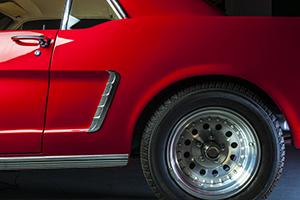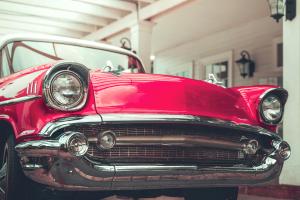10 things to know before buying a collector car

Collector cars are more than just vehicles - they are cherished pieces of history, art and culture. From classic muscle cars to elegant vintage models, collector cars hold a special place in the hearts of passionate car enthusiasts and collectors alike. However, with special cars come unique considerations when buying one for the first time. Before you hit the road, consider these 10 collector car tips.
1. Rare isn't always best
The rarer the model, the more investment and upkeep the vehicle may require. As a first-time owner of a collector vehicle, a popular model may be a safer bet. The more popular the car, the easier it may be to find affordable, readily available parts. Some popular collector cars include Ford Mustangs, Chevy Corvettes, Chevy Bel-Airs and MGBs.
2. Reputable mechanics are essential
Identify a highly recommended mechanic who specializes in collector vehicles. Keep in mind that they may charge expensive maintenance fees. For this reason, it can be worth learning simple repairs and maintenance that can be done at home. Performing your own maintenance if you are able can save you money, but you may need to source replacement components from time to time. For any repairs or maintenance that are beyond your expertise, you should visit your local mechanic.
3. Avoid rust at all costs
Beware of any rusting on the vehicle. Restoring a car with rust can require extensive replacements and bodywork treatments, which can diminish the character of the car. Rust also may indicate that the car has had years of neglect and poor maintenance and will likely need work on various components. It's best to avoid buying collector vehicles with any rusting to steer clear of additional costs in the future.
4. Where you plan to go
Collector cars can be driven in a variety of settings. You can show it off on the road, at a classic car show or admire it from your garage. Where you take your vehicle and how often you drive it will greatly impact the type of collector car you buy. It's best to consider the durability of a collector vehicle before making a purchase.
5. Return on investment is not guaranteed
Based on the model, ownership costs may outweigh a collector car’s selling price in the future. If the vehicle is a rare model, sourcing parts will be significantly more expensive, as well as restoration projects and specialized labor costs. If you decide to sell your vehicle in the future, some companies offer a valuation tool where you can find collector car values by the make, vehicle type, or vehicle identification number (VIN). These tools are typically based on historical sales data, market trends and unique attributes of your vehicle.
6. The ins and outs of your dream car
Research the make and model thoroughly. This includes the car’s history, maintenance costs, parts availability, common mechanical issues, online reviews and advice from your mechanic regarding upkeep and repairs. You can also research the value of similar vehicles to get an idea of the car’s value to avoid overpaying. Oftentimes, understanding the ongoing costs of your collector car is more important than the initial purchase price.
7. Always inspect before you buy
Get the car professionally inspected for flaws and structural damage. Ordering a professional inspection helps ensure that the car is in stable condition and that the seller’s claims are truthful. Inspectors can also offer some insight into how much the car is worth. Pre-purchase inspections can reveal hidden problems such as worn-out brake systems, faulty electrical wiring and old trunk seals, which will prevent costly repairs down the road.
8. Who you're buying from
There are multiple ways to purchase a collector car, whether it be through an auction, a dealership or a private seller. It's important to know the pros and cons of each method. Buying from an auction may result in a bargain, but there are limited options for a thorough inspection before you buy. Reputable dealerships will give you more security on what you’re buying, but it may come at a higher price. Private sellers can offer a lower price with no middlemen involved, but you must verify their claims before making any decisions.
9. Where you'll store it
Protecting your classic car is key to preserving its value. Have a plan for where you’ll be storing your classic vehicle. Ideally, classic cars should be stored in your garage, sheltered from rain, snow and the sun. Another option is classic car storage facilities, which have regulated temperature and moisture controls that will prevent your car from deteriorating.
10. How to choose the right insurance
Choosing the right insurance package is imperative to protect your classic car against theft and damage. Before buying a classic vehicle, review the insurer’s policies to see if your vehicle qualifies. Common requirements for insuring a classic car include low usage or mileage, a proper place to store the car and no serious infractions on the driver’s record. When choosing insurance, it's important to find an insurer who is knowledgeable about classic cars, so they are familiar with the type of coverage needed to protect rare or antique vehicles.
Are you protected from out-of-pocket costs in the event of a loss or accident? Talk to your independent agent today.
Sources:
All products are underwritten by The Hanover Insurance Company or one of its insurance company subsidiaries or affiliates (“The Hanover”). Coverage may not be available in all jurisdictions and is subject to the company underwriting guidelines and the issued policy. This material is provided for informational purposes only and does not provide any coverage or guarantee loss prevention. For more information about The Hanover visit our website at www.hanover.com.
LC 2024-084
Related resources
10 things to know before buying a collector car
Collector cars are more than just vehicles - they are cherished pieces of history, art and culture. From classic muscle cars to elegant vintage models, collector cars hold a special place in the hearts of passionate car enthusiasts and collectors alike. However, with special cars come unique considerations when buying one for the first time. Before you hit the road, consider these 10 collector car tips.
1. Rare isn't always best
The rarer the model, the more investment and upkeep the vehicle may require. As a first-time owner of a collector vehicle, a popular model may be a safer bet. The more popular the car, the easier it may be to find affordable, readily available parts. Some popular collector cars include Ford Mustangs, Chevy Corvettes, Chevy Bel-Airs and MGBs.
2. Reputable mechanics are essential
Identify a highly recommended mechanic who specializes in collector vehicles. Keep in mind that they may charge expensive maintenance fees. For this reason, it can be worth learning simple repairs and maintenance that can be done at home. Performing your own maintenance if you are able can save you money, but you may need to source replacement components from time to time. For any repairs or maintenance that are beyond your expertise, you should visit your local mechanic.
3. Avoid rust at all costs
Beware of any rusting on the vehicle. Restoring a car with rust can require extensive replacements and bodywork treatments, which can diminish the character of the car. Rust also may indicate that the car has had years of neglect and poor maintenance and will likely need work on various components. It's best to avoid buying collector vehicles with any rusting to steer clear of additional costs in the future.
4. Where you plan to go
Collector cars can be driven in a variety of settings. You can show it off on the road, at a classic car show or admire it from your garage. Where you take your vehicle and how often you drive it will greatly impact the type of collector car you buy. It's best to consider the durability of a collector vehicle before making a purchase.
5. Return on investment is not guaranteed
Based on the model, ownership costs may outweigh a collector car’s selling price in the future. If the vehicle is a rare model, sourcing parts will be significantly more expensive, as well as restoration projects and specialized labor costs. If you decide to sell your vehicle in the future, some companies offer a valuation tool where you can find collector car values by the make, vehicle type, or vehicle identification number (VIN). These tools are typically based on historical sales data, market trends and unique attributes of your vehicle.
6. The ins and outs of your dream car
Research the make and model thoroughly. This includes the car’s history, maintenance costs, parts availability, common mechanical issues, online reviews and advice from your mechanic regarding upkeep and repairs. You can also research the value of similar vehicles to get an idea of the car’s value to avoid overpaying. Oftentimes, understanding the ongoing costs of your collector car is more important than the initial purchase price.
7. Always inspect before you buy
Get the car professionally inspected for flaws and structural damage. Ordering a professional inspection helps ensure that the car is in stable condition and that the seller’s claims are truthful. Inspectors can also offer some insight into how much the car is worth. Pre-purchase inspections can reveal hidden problems such as worn-out brake systems, faulty electrical wiring and old trunk seals, which will prevent costly repairs down the road.
8. Who you're buying from
There are multiple ways to purchase a collector car, whether it be through an auction, a dealership or a private seller. It's important to know the pros and cons of each method. Buying from an auction may result in a bargain, but there are limited options for a thorough inspection before you buy. Reputable dealerships will give you more security on what you’re buying, but it may come at a higher price. Private sellers can offer a lower price with no middlemen involved, but you must verify their claims before making any decisions.
9. Where you'll store it
Protecting your classic car is key to preserving its value. Have a plan for where you’ll be storing your classic vehicle. Ideally, classic cars should be stored in your garage, sheltered from rain, snow and the sun. Another option is classic car storage facilities, which have regulated temperature and moisture controls that will prevent your car from deteriorating.
10. How to choose the right insurance
Choosing the right insurance package is imperative to protect your classic car against theft and damage. Before buying a classic vehicle, review the insurer’s policies to see if your vehicle qualifies. Common requirements for insuring a classic car include low usage or mileage, a proper place to store the car and no serious infractions on the driver’s record. When choosing insurance, it's important to find an insurer who is knowledgeable about classic cars, so they are familiar with the type of coverage needed to protect rare or antique vehicles.
Are you protected from out-of-pocket costs in the event of a loss or accident? Talk to your independent agent today.
Sources:
All products are underwritten by The Hanover Insurance Company or one of its insurance company subsidiaries or affiliates (“The Hanover”). Coverage may not be available in all jurisdictions and is subject to the company underwriting guidelines and the issued policy. This material is provided for informational purposes only and does not provide any coverage or guarantee loss prevention. For more information about The Hanover visit our website at www.hanover.com.
LC 2024-084
Related resources
10 things to know before buying a collector car
Collector cars are more than just vehicles - they are cherished pieces of history, art and culture. From classic muscle cars to elegant vintage models, collector cars hold a special place in the hearts of passionate car enthusiasts and collectors alike. However, with special cars come unique considerations when buying one for the first time. Before you hit the road, consider these 10 collector car tips.
1. Rare isn't always best
The rarer the model, the more investment and upkeep the vehicle may require. As a first-time owner of a collector vehicle, a popular model may be a safer bet. The more popular the car, the easier it may be to find affordable, readily available parts. Some popular collector cars include Ford Mustangs, Chevy Corvettes, Chevy Bel-Airs and MGBs.
2. Reputable mechanics are essential
Identify a highly recommended mechanic who specializes in collector vehicles. Keep in mind that they may charge expensive maintenance fees. For this reason, it can be worth learning simple repairs and maintenance that can be done at home. Performing your own maintenance if you are able can save you money, but you may need to source replacement components from time to time. For any repairs or maintenance that are beyond your expertise, you should visit your local mechanic.
3. Avoid rust at all costs
Beware of any rusting on the vehicle. Restoring a car with rust can require extensive replacements and bodywork treatments, which can diminish the character of the car. Rust also may indicate that the car has had years of neglect and poor maintenance and will likely need work on various components. It's best to avoid buying collector vehicles with any rusting to steer clear of additional costs in the future.
4. Where you plan to go
Collector cars can be driven in a variety of settings. You can show it off on the road, at a classic car show or admire it from your garage. Where you take your vehicle and how often you drive it will greatly impact the type of collector car you buy. It's best to consider the durability of a collector vehicle before making a purchase.
5. Return on investment is not guaranteed
Based on the model, ownership costs may outweigh a collector car’s selling price in the future. If the vehicle is a rare model, sourcing parts will be significantly more expensive, as well as restoration projects and specialized labor costs. If you decide to sell your vehicle in the future, some companies offer a valuation tool where you can find collector car values by the make, vehicle type, or vehicle identification number (VIN). These tools are typically based on historical sales data, market trends and unique attributes of your vehicle.
6. The ins and outs of your dream car
Research the make and model thoroughly. This includes the car’s history, maintenance costs, parts availability, common mechanical issues, online reviews and advice from your mechanic regarding upkeep and repairs. You can also research the value of similar vehicles to get an idea of the car’s value to avoid overpaying. Oftentimes, understanding the ongoing costs of your collector car is more important than the initial purchase price.
7. Always inspect before you buy
Get the car professionally inspected for flaws and structural damage. Ordering a professional inspection helps ensure that the car is in stable condition and that the seller’s claims are truthful. Inspectors can also offer some insight into how much the car is worth. Pre-purchase inspections can reveal hidden problems such as worn-out brake systems, faulty electrical wiring and old trunk seals, which will prevent costly repairs down the road.
8. Who you're buying from
There are multiple ways to purchase a collector car, whether it be through an auction, a dealership or a private seller. It's important to know the pros and cons of each method. Buying from an auction may result in a bargain, but there are limited options for a thorough inspection before you buy. Reputable dealerships will give you more security on what you’re buying, but it may come at a higher price. Private sellers can offer a lower price with no middlemen involved, but you must verify their claims before making any decisions.
9. Where you'll store it
Protecting your classic car is key to preserving its value. Have a plan for where you’ll be storing your classic vehicle. Ideally, classic cars should be stored in your garage, sheltered from rain, snow and the sun. Another option is classic car storage facilities, which have regulated temperature and moisture controls that will prevent your car from deteriorating.
10. How to choose the right insurance
Choosing the right insurance package is imperative to protect your classic car against theft and damage. Before buying a classic vehicle, review the insurer’s policies to see if your vehicle qualifies. Common requirements for insuring a classic car include low usage or mileage, a proper place to store the car and no serious infractions on the driver’s record. When choosing insurance, it's important to find an insurer who is knowledgeable about classic cars, so they are familiar with the type of coverage needed to protect rare or antique vehicles.
Are you protected from out-of-pocket costs in the event of a loss or accident? Talk to your independent agent today.
Sources:
All products are underwritten by The Hanover Insurance Company or one of its insurance company subsidiaries or affiliates (“The Hanover”). Coverage may not be available in all jurisdictions and is subject to the company underwriting guidelines and the issued policy. This material is provided for informational purposes only and does not provide any coverage or guarantee loss prevention. For more information about The Hanover visit our website at www.hanover.com.
LC 2024-084
Related resources
10 things to know before buying a collector car
Collector cars are more than just vehicles - they are cherished pieces of history, art and culture. From classic muscle cars to elegant vintage models, collector cars hold a special place in the hearts of passionate car enthusiasts and collectors alike. However, with special cars come unique considerations when buying one for the first time. Before you hit the road, consider these 10 collector car tips.
1. Rare isn't always best
The rarer the model, the more investment and upkeep the vehicle may require. As a first-time owner of a collector vehicle, a popular model may be a safer bet. The more popular the car, the easier it may be to find affordable, readily available parts. Some popular collector cars include Ford Mustangs, Chevy Corvettes, Chevy Bel-Airs and MGBs.
2. Reputable mechanics are essential
Identify a highly recommended mechanic who specializes in collector vehicles. Keep in mind that they may charge expensive maintenance fees. For this reason, it can be worth learning simple repairs and maintenance that can be done at home. Performing your own maintenance if you are able can save you money, but you may need to source replacement components from time to time. For any repairs or maintenance that are beyond your expertise, you should visit your local mechanic.
3. Avoid rust at all costs
Beware of any rusting on the vehicle. Restoring a car with rust can require extensive replacements and bodywork treatments, which can diminish the character of the car. Rust also may indicate that the car has had years of neglect and poor maintenance and will likely need work on various components. It's best to avoid buying collector vehicles with any rusting to steer clear of additional costs in the future.
4. Where you plan to go
Collector cars can be driven in a variety of settings. You can show it off on the road, at a classic car show or admire it from your garage. Where you take your vehicle and how often you drive it will greatly impact the type of collector car you buy. It's best to consider the durability of a collector vehicle before making a purchase.
5. Return on investment is not guaranteed
Based on the model, ownership costs may outweigh a collector car’s selling price in the future. If the vehicle is a rare model, sourcing parts will be significantly more expensive, as well as restoration projects and specialized labor costs. If you decide to sell your vehicle in the future, some companies offer a valuation tool where you can find collector car values by the make, vehicle type, or vehicle identification number (VIN). These tools are typically based on historical sales data, market trends and unique attributes of your vehicle.
6. The ins and outs of your dream car
Research the make and model thoroughly. This includes the car’s history, maintenance costs, parts availability, common mechanical issues, online reviews and advice from your mechanic regarding upkeep and repairs. You can also research the value of similar vehicles to get an idea of the car’s value to avoid overpaying. Oftentimes, understanding the ongoing costs of your collector car is more important than the initial purchase price.
7. Always inspect before you buy
Get the car professionally inspected for flaws and structural damage. Ordering a professional inspection helps ensure that the car is in stable condition and that the seller’s claims are truthful. Inspectors can also offer some insight into how much the car is worth. Pre-purchase inspections can reveal hidden problems such as worn-out brake systems, faulty electrical wiring and old trunk seals, which will prevent costly repairs down the road.
8. Who you're buying from
There are multiple ways to purchase a collector car, whether it be through an auction, a dealership or a private seller. It's important to know the pros and cons of each method. Buying from an auction may result in a bargain, but there are limited options for a thorough inspection before you buy. Reputable dealerships will give you more security on what you’re buying, but it may come at a higher price. Private sellers can offer a lower price with no middlemen involved, but you must verify their claims before making any decisions.
9. Where you'll store it
Protecting your classic car is key to preserving its value. Have a plan for where you’ll be storing your classic vehicle. Ideally, classic cars should be stored in your garage, sheltered from rain, snow and the sun. Another option is classic car storage facilities, which have regulated temperature and moisture controls that will prevent your car from deteriorating.
10. How to choose the right insurance
Choosing the right insurance package is imperative to protect your classic car against theft and damage. Before buying a classic vehicle, review the insurer’s policies to see if your vehicle qualifies. Common requirements for insuring a classic car include low usage or mileage, a proper place to store the car and no serious infractions on the driver’s record. When choosing insurance, it's important to find an insurer who is knowledgeable about classic cars, so they are familiar with the type of coverage needed to protect rare or antique vehicles.
Are you protected from out-of-pocket costs in the event of a loss or accident? Talk to your independent agent today.
Sources:
All products are underwritten by The Hanover Insurance Company or one of its insurance company subsidiaries or affiliates (“The Hanover”). Coverage may not be available in all jurisdictions and is subject to the company underwriting guidelines and the issued policy. This material is provided for informational purposes only and does not provide any coverage or guarantee loss prevention. For more information about The Hanover visit our website at www.hanover.com.
LC 2024-084





